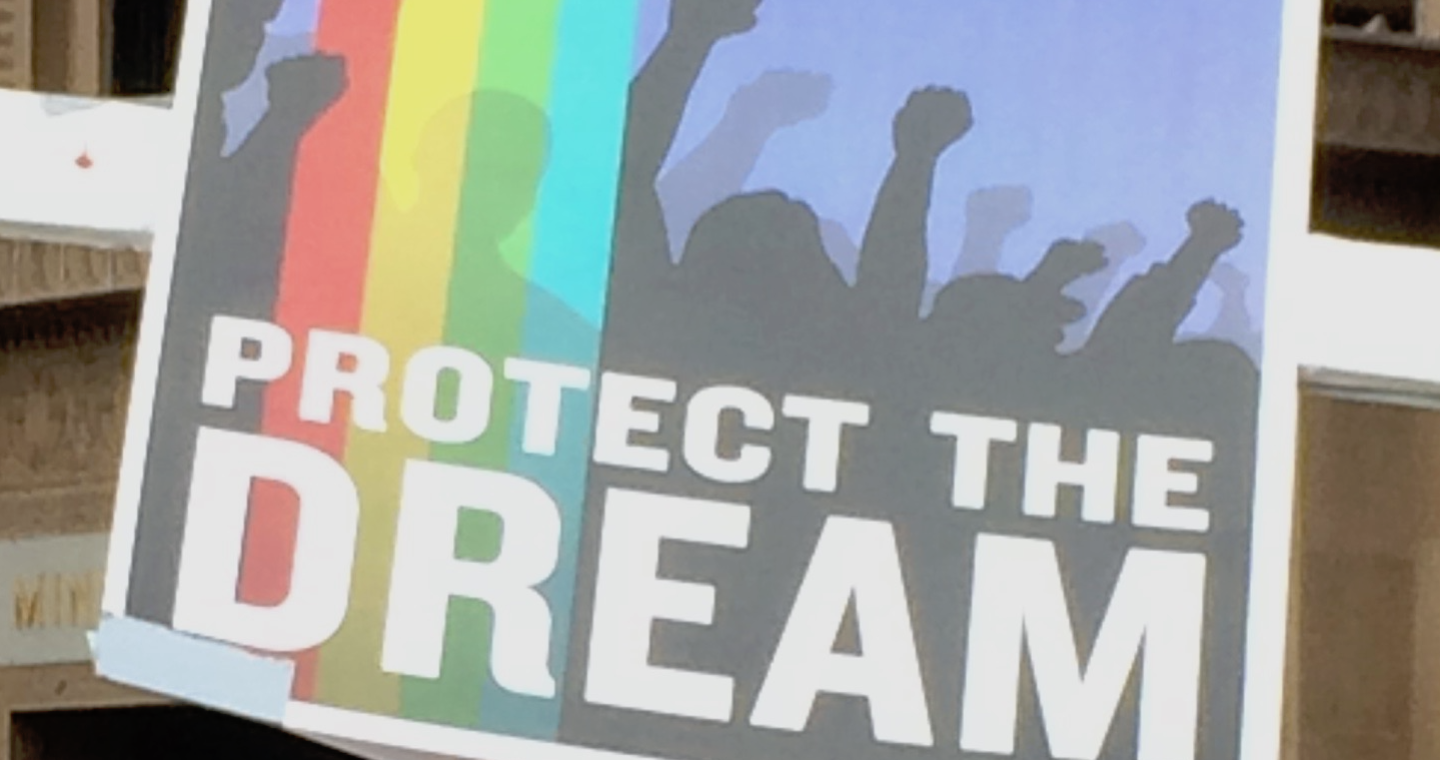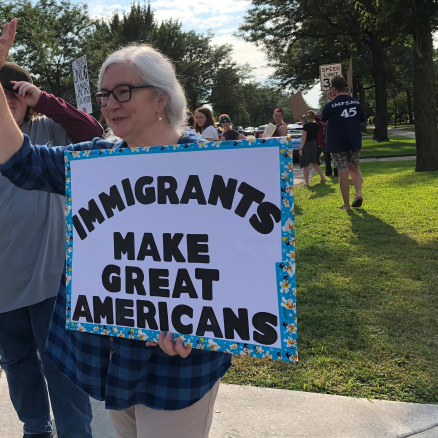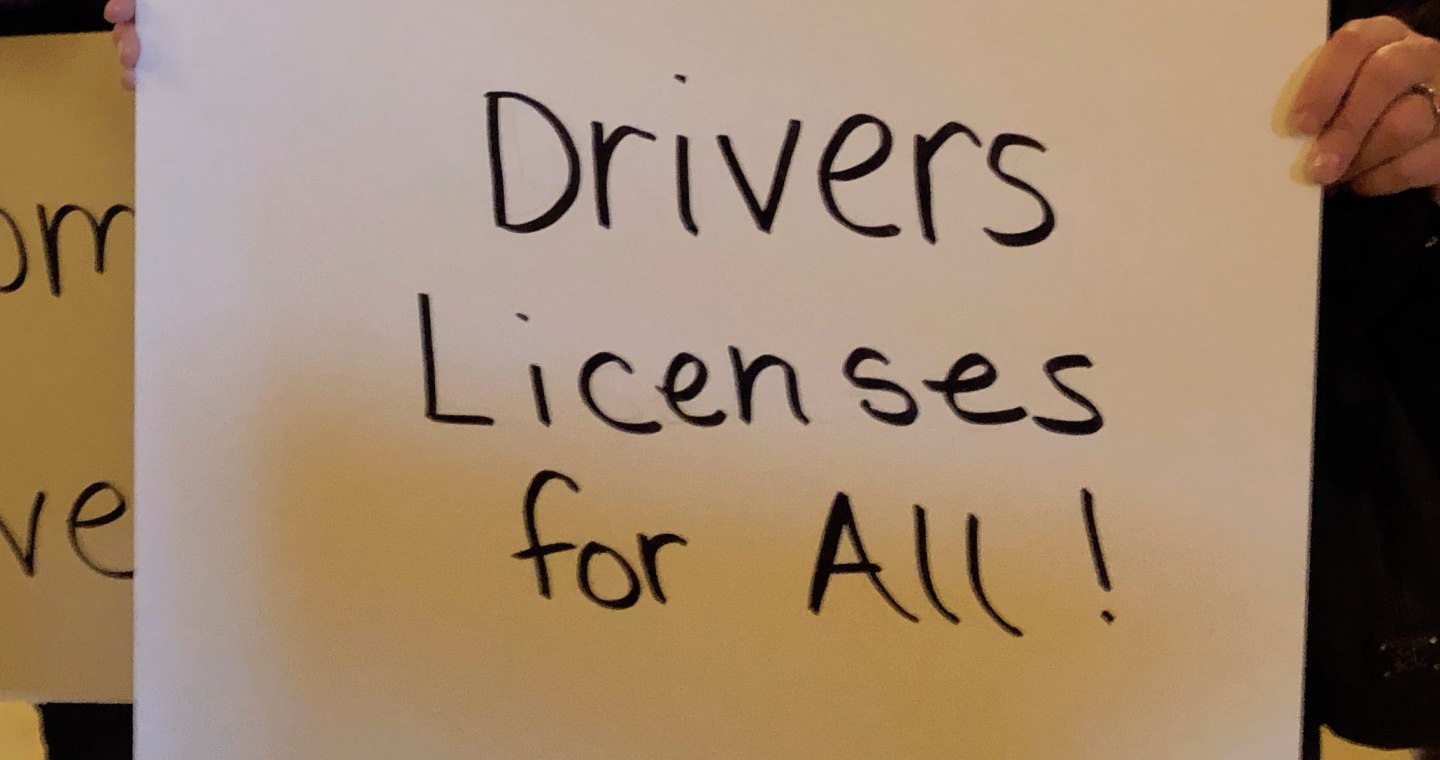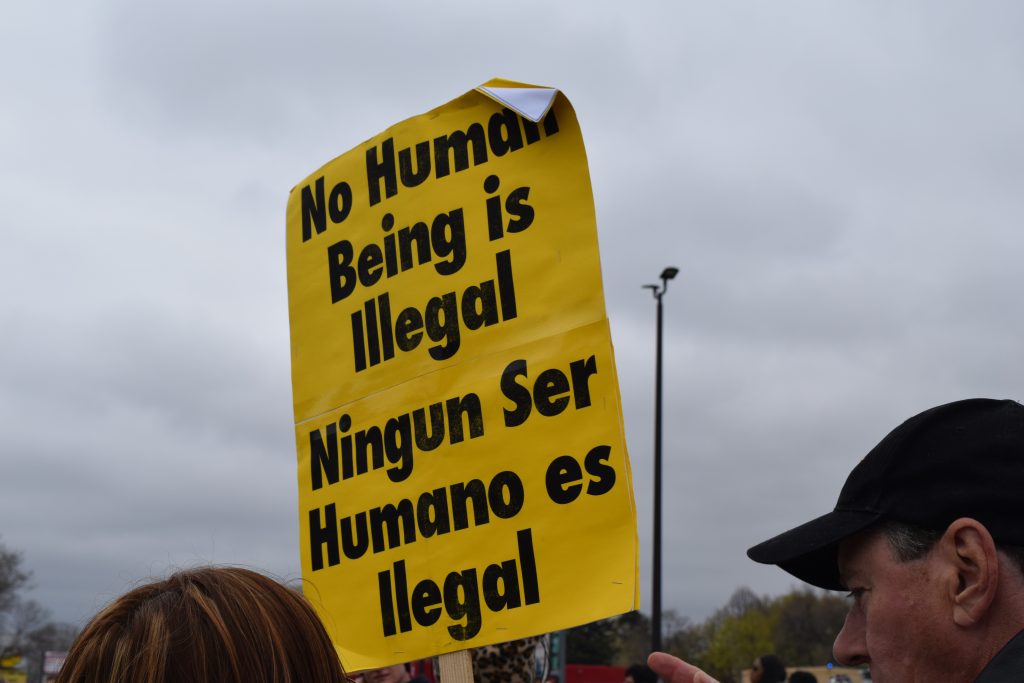June 3, 2019: Immigrant eligibility for public benefits is already limited. Trump’s May 23 memo, not yet law, may impose more future restrictions.
Archives
HUD Proposed Rule on Mixed-Status Families: Q&A
HUD’s proposed new rule would bar ineligible immigrants from living in subsidized housing with their families.
Minnesota Impact of American Dream and Promise Act
Minnesota is home to 19,800 immigrants who are eligible for protection under the Dream and Promise Act.
We Will Continue to Work for Driver’s Licenses For All
SAINT PAUL — Following the news that the Driver’s Licenses For All bill will not be passed during the 2019 legislative session, the Freedom 2 Drive coalition released the following statement.
“We are disappointed and pained at the failure of the legislature to pass Driver’s Licenses For All bill in the 2019 session.
“We are proud of the Asia American Pacific Islanders, Black and Latino immigrants across Minnesota who shaped and informed the Freedom to Drive campaign. We are inspired by the courage of vulnerable community members who told their stories over and over again to appeal to legislators.
“We are encouraged by the strong support shown by business, law enforcement, faith leaders, civic groups, and people across Minnesota. We know that the majority of Minnesotans support restoring access to driver’s licenses for all. We will continue to work toward restoring access to driver’s licenses for all because this is legislation that ALL Minnesota needs.
“We are disappointed in the Senate Republicans’ racist and obstructionist platform that is only interested in dividing us to distract from their unpopular policies than it is in helping Minnesotan families.
“We appreciate the support from Governor Tim Walz and Lieutenant Governor, Peggy Flannagan as well as the leadership of Representatives Ryan Winkler and Aisha Gomez and their staff who authored and helped the driver’s license bill pass the House floor for the first time ever.
“Access to driver’s licenses is important for public safety, economic growth, and the dignity of our community members. Every day, Minnesota residents who are undocumented go to work, care for family members, attend school, advocate for positive changes, and connect with other residents in the farmlands, small towns, and cities of Minnesota. Their contributions help Minnesota maintain strong, vibrant communities that ensure that the state is an attractive place to live and raise a family. We need them and all that they contribute to our Minnesota community. They need driver’s licenses.
“Once again vulnerable members of our community are being excluded from having access to driver’s licenses. This session’s failure is painful and unfair, but we will not give up.
“We remind ourselves that while the federal government is turning its back on working class immigrants—those who work the night shifts, behind shop counters, and in kitchens, factories and mines, nannies, health care workers, students, service, hospitality, farm and dairy workers—they are a part of making this country better for everyone.
“We will rest and take care of ourselves, and we will be back. We will continue to organize, today, tomorrow and in every election and legislative session to protect our families and friends.”
No Human is Illegal
(For a printable PDF version of this Fact Sheet, click here.)
No Human is Illegal
- Most people without documents in the United States entered the country legally. Some have overstayed their visas. Some are waiting for visas or extensions to be processed. That does not mean that they are “illegal.”
- If you have ever run through a stop sign or driven above the speed limit, you have committed an illegal act. This does not mean that you are an “illegal driver.”
- Using the word “illegal” to describe undocumented immigrants is dehumanizing, inflammatory, and inaccurate.
Living in the United States without documentation is a civil offense, not a criminal one.
- Living in the U.S. without legal authorization (unlawful presence) is a civil offense, while improper entry (crossing the border without inspection), is a misdemeanor.
- Most immigrants who do not have proper documentation arrived in the United States legally, and therefore have not committed a crime.
AP Stylebook: Describe actions, not people.
- In April,2013, The Associated Press changed its stylebook to take away the use of “illegal” when writing about individuals:
“illegal immigration Entering or residing in a country in violation of civil or criminal law. Except in direct quotes essential to the story, use illegal only to refer to an action, not a person: illegal immigration, but not illegal immigrant. Acceptable variations include living in or entering a country illegally or without legal permission.”
- Labels “[end] up pigeonholing people or creating long descriptive titles where you use some main event in someone’s life to become the modifier before their name,” said AP Senior Vice President and Executive Editor, Kathleen Carroll.
- Phrases such as “illegal immigrant” and “illegal alien” replace ever-changing legal circumstances and unique situations and stories with an unspecified assumption of guilt.
- These dehumanizing terms and phrases oversimplify the complex situations of individual people.
- Do not repeat inflammatory language used by the government or news sources. The more a word or phrase is repeated, the more power it holds and the more popular it becomes.
Congress: Pass the Promise and Dream Act!
 One day before the House Judiciary Committee markup of legislation containing protections for immigrant youth known as Dreamers and long-time beneficiaries of Temporary Protected Status (TPS) and Deferred Enforced Departure (DED), ILCM joined with 400 national, regional, and local groups in sending a letter urging Congress to pass the legislation. Here is our letter:
One day before the House Judiciary Committee markup of legislation containing protections for immigrant youth known as Dreamers and long-time beneficiaries of Temporary Protected Status (TPS) and Deferred Enforced Departure (DED), ILCM joined with 400 national, regional, and local groups in sending a letter urging Congress to pass the legislation. Here is our letter:
May 21, 2019
Dear Speaker Pelosi, Leader McCarthy, Chairman Nadler, and Ranking Member Collins,
We, the undersigned national, state, and local education, civil and human rights, LGBTQ+, labor, national security, faith, grassroots, and immigrants’ rights organizations, write to express our support for the American Dream and Promise Act as it goes before the House Judiciary Committee for markup. The legislation would put immigrant youth known as Dreamers and long-time beneficiaries of Temporary Protected Status (TPS) and Deferred Enforced Departure (DED) on a roadmap to citizenship.
Over the past two years, the Trump administration has taken steps to end Deferred Action for Childhood Arrivals (DACA) and strip status from nearly every individual with TPS and all of those with DED. Only a small number of preliminary injunctions prevent these individuals from facing the prospect of detention and deportation. The administration’s actions are inflicting enormous pain and uncertainty on more than a million people—not to mention their families and their communities who face an impending separation crisis.
These individuals live in every state and every congressional district. They are our classmates and our teachers, our coworkers and our employers. They worship with us and help to keep us safe. They contribute to our great nation in myriad ways. The average DACA recipient came to the country at age six, while the average TPS holder has been in the country for 22 years. Between them, they have nearly 500,000 U.S. citizen children, not to mention many hundreds of thousands more U.S. citizen parents, spouses, and siblings, all of whom are suffering already and will suffer still more if the Trump administration is successful in ending their protections.
Dreamers and beneficiaries of TPS and DED also are vital to the economic health of our nation: They work in a range of critical industries, from construction—particularly in states such as Texas, California, Florida, Virginia, and North Carolina that are still recovering from natural disasters—to child care, to health care, to education, and more. Many work for Fortune 500 companies or have started their own businesses, creating jobs and economic opportunities for their fellow Americans. They pay billions of dollars in federal, state, and local taxes each year.
And while court rulings have allowed current DACA beneficiaries, and TPS holders from El Salvador, Haiti, Honduras, Nepal, Nicaragua, and Sudan, the opportunity to maintain protections for now, the Trump administration is fighting back aggressively. These court injunctions also offer no relief to Dreamers who were eligible for DACA, or would have aged into DACA, but were locked out of the program when the Trump administration ended it, or to TPS holders from countries not now covered by the preliminary court orders. Moreover, just 3 days before Liberians with DED who have lived and worked in the United States lawfully since at least 2002—and many for far longer—were going to lose their status and find themselves vulnerable to being ripped from their families and communities, detained and deported, the Trump administration announced a one-year reprieve.
There are many parts of the immigration system that urgently need fixing, but protecting Dreamers and beneficiaries of TPS and DED cannot wait. It is long past time to recognize that these individuals are part of the American family and merit protection from deportation, permanent status, and a path to eventual citizenship. They and their families and communities at long last deserve the peace of mind to be able to plan ahead and make a better life that others take for granted. We stand ready to work with you to quickly pass this common-sense legislation.
Sincerely,
National Groups
Advocates for Youth
African American Ministers In Action
African Communities Together
AIDS United
Alianza Americas
America’s Voice
American Civil Liberties Union
American Federation of Labor-Congress of Industrial Organizations (AFL-CIO)
American Federation of Teachers
American Friends Service Committee
American GI Forum of the US
American Immigration Lawyers Association
American-Arab Anti-Discrimination Committee (ADC)
Anti-Defamation League
Asian & Pacific Islander American Health Forum
Asian American Legal Defense and Education Fund (AALDEF)
Asian Americans Advancing Justice
Asian Pacific American Labor Alliance, AFL-CIO
Asian Pacific Institute on Gender-Based Violence
ASISTA
ASPIRA Association
Association of Latino Administrators and Superintendents
AsylumConnect
Athlete Ally
Autistic Self Advocacy Network
Bend the Arc: Jewish Action
Bread for the World
California Coalition Against Sexual Assault (CALCASA)
Casa de Esperanza: National Latina Network for Healthy Families and Communities
Center for American Progress
Center for Popular Democracy
Center for Victims of Torture
CenterLink: The Community of LGBT Centers
Centro de los Derechos del Migrante, Inc.
Christian Community Development Association
Church World Service
Citizens for Criminal JUSTICE
Clearinghouse on Women’s Issues
Coalition on Human Needs
Columban Center for Advocacy and Outreach
Columbia Law School Immigrants’ Rights Clinic Communications Workers of America
Congregation of Our Lady of the Good Shepherd, US Provinces
Congressional Hispanic Caucus Institute
Council for Global Equality
Council of Administrators of Special Education
Council on American-Islamic Relations (CAIR)
Daily Kos
Defending Rights & Dissent
Democrats for Education Reform
Diaspora in Action
Disability Rights Education & Defense Fund (DREDF)
Disciples Refugee & Immigration Ministries
Earthjustice
EDGE Consulting
Educators for Excellence
Episcopal Diocese of S.E Florida
Fair Immigration Reform Movement (FIRM)
Faith in Public Life
Families Belong Together
Family Action Network Movement (FANM)
Farmworker Justice
Federation des Associations Regionales Haitiennes de la Diaspora (FAREHD)
Federation of Liberia Mandingo Associations in the USA
Feminist Majority Foundation
First Focus
Fondasyon Mapou
FORGE, Inc.
Franciscan Action Network
Freedom for Immigrants
Freedom Forward
Freedom Network USA
Friends Committee on National Legislation
Gender Spectrum
Generation Progress
GLMA: Health Professionals Advancing LGBTQ Equality
GLSEN
Grand Kru County Development Association in the Americas
GreenLatinos
HIAS
Hip Hop Caucus
Hispanic Association of Colleges and Universities (HACU)
Hispanic Federation
Hispanic National Bar Association
Hispanics in Philanthropy
HOPE Border Institute
Human Rights Campaign
Human Rights Watch
Immigration Hub
In Our Own Voice: National Black Women’s Reproductive Justice Agenda
Indivisible
Institute for Justice & Democracy in Haiti
Interfaith Worker Justice
International Association for College Admission Counseling
International Rescue Committee (IRC)
InterReligious Task Force on Central America and Colombia
Japanese American Citizens League
Jewish Council for Public Affairs
Jobs With Justice
Kids in Need of Defense
KIPP
Labor Council For Latin American Advancement
Latin America Working Group (LAWG)
LatinoJustice PRLDEF
Leadership Conference of Women Religious
League of Women Voters of the United States
Main Street Alliance
MALDEF
MANA, A National Latina Organization
Mennonite Central Committee U.S. Washington Office
Mi Familia Vota
MomsRising
Movement Advancement Project
MoveOn
NAACP
NAACP Legal Defense and Educational Fund, Inc.
NARAL Pro-Choice America
National Action Network
National Advocacy Center of the Sisters of the Good Shepherd
National Asian Pacific American Women’s Forum (NAPAWF)
National Association for College Admission Counseling
National Association of Hispanic Federal Executives
National Black Justice Coalition
National Center for Lesbian Rights
National Center for Transgender Equality Coalition Against Domestic Violence
National Council of Churches
National Council of Jewish Women
National Domestic Violence Hotline
National Domestic Workers Alliance
National Education Association
National Employment Law Project
National Employment Lawyers Association
National Equality Action Team (NEAT)
National Health Law Program
National Hispanic Medical Association
National Human Services Assembly
National Immigrant Justice Center
National Immigration Law Center
National Institute for Reproductive Health (NIRH)
National Korean American Service & Education Consortium (NAKASEC)
National Latina Institute for Reproductive Health
National Latinx Psychological Association
National LGBTQ Task Force Action Fund
National Network for Immigrant and Refugee Rights
National Organization for Women
National Partnership for New Americans
National Partnership for Women & Families
National Queer Asian Pacific Islander Alliance (NQAPIA)
National Religious Campaign Against Torture
National Skills Coalition
National Survivor Network
National Women’s Law Center
NETWORK Lobby
NextGen America
NHCSL – The National Hispanic Caucus of State Legislators
OutServe-SLDN
Oxfam America
People’s Action Institute
Physicians for Reproductive Health
Planned Parenthood Federation of America
Population Connection Action Fund
Positive Women’s Network USA
Presbyterian Church (U.S.A.)
Presidents’ Alliance on Higher Education and Immigration
Pride at Work
Public Citizen
School Social Work Association of America
SchoolHouse Connection
Service Employees International Union
Sexuality Information and Education Council of the United States (SIECUS)
Sierra Club
Sisters of Mercy of the Americas – Institute Justice Team
Sisters of Mercy South Central Community
Sojourners
South Asian Americans Leading Together (SAALT)
Southern Border Communities Coalition
SparkAction
Stand for Children
Sull and Associates, PLLC
T’ruah: The Rabbinic Call for Human Rights
TASH
Teach Plus
The Education Trust
The Pluralism Project
The Revolutionary Love Project
The United Methodist Church – General Board of Church and Society
Truman National Security Project
UFW Foundation
Ujima, Inc.: The National Center on Violence Against Women in the Black Community
ULAA
UndocuBlack Network
UnidosUS
Union for Reform Judaism
Unión=Fuerza Latinx Institute
Unitarian Universalist Association
Unitarian Universalist Service Committee
UNITE HERE
United Farm Workers (UFW)
United Nimba Citizens’ Council (UNICCO)
United States Hispanic Leadership Institute
United We Dream
URGE: Unite for Reproductive & Gender Equity
Voices for Progress
Voto Latino
Washington DC Area Liberia Mandingo Association
Washington Office on Latin America (WOLA)
We Are All America
Win Without War
Witness to Mass Incarceration
Women for Afghan Women
Working Families United
Year Up
Young Center for Immigrant Children’s Rights
Young Invincibles
YWCA USA
State and Local Groups
350Seattle
Academy of Medical & Public Health Services
Adhikaar
Advocates for Basic Legal Equality, Inc.
AFSC Colorado
Al Otro Lado
All Saints Church
Alliance for a Better Community
Apostle Immigrant Services, Corporation
Arab American Association of New York
Arizona Center for Empowerment (ACE)
Arizona Dream Act Coalition
Arkansas United
Arsht Cannon Fund
Asian Counseling & Referral Service
Association of Haitian Women (AFAB)
Breakthrough Schools
Cabrini Immigrant Services of NYC, Inc.
CAIR Florida
CARECEN DC
CASA
Casa Latina
Catholic Charities Tompkins/Tioga
Catholic Legal Services, Archdiocese of Miami
Causa Oregon
Center for the Human Rights of Children, Loyola University Chicago School of Law
Central Indiana Jobs With Justice
Children’s Defense Fund-New York
Chinese-American Planning Council
Clergy and laity United for Economic Justice
Cleveland Jobs with Justice
Coalition for Humane Immigrant Rights (CHIRLA)
Coalition of Refugee Service Agencies
Colorado Immigrant Rights Coalition
Columbia Legal Services
CONNECT Safe Families Peaceful Communities
Connecticut Students for a Dream
Conversations with Friends
Culinary Union
DC Coalition Against Domestic Violence
DMV Sanctuary Congregation Network
Dolores Street Community Services
DoTheMostGood Montgomery County, MD
Dreamer Fund
DRUM: Desis Rising Up and Moving
East Texas Justice For Our Neighbors
El Concilio/Hispanic American Council
El Rescate
Emerald Isle Immigration Center Employee Rights Center
End Domestic Abuse WI
Enlace Comunitario
Entre Hermanos
Equality California
Equality North Carolina
Family Rights Network
FL Immigrant Coalition
Florida Coastal School of law Clinical Programs
Friends of Broward Detainees
Friends of Miami-Dade Detainees
Fuerza del Valle
Gainesville Interfaith Alliance for Immigrant Justice
Georgia AFL-CIO
Georgia Association of Latino Elected Officials (GALEO)
Georgia Equality
Georgia NAACP
H.O.P.E. Ministries of Georgia, Inc.
Haitian American Democratic Club of Broward County
HAITIAN ARTISTS ASSEMBLY OF MASSACHUSETTS
Haitian Bridge Alliance
Haitian Centers Council, Inc.
Haitian-Americans United, Inc. (H.A.U.)
Hispanic Federation Connecticut State Office
Hispanics In Politics
II Los Angeles
Illinois Accountability Initiative
Illinois Association for College Admission Counseling
Immigrant Allies of Marshalltown
Immigrant Family Services Institute
Immigrant Law Center of Minnesota
Immigrant Legal Advocacy Project
Indivisible Eastside-WA
Indivisible Vashon
Inland Empire Immigrant Youth Collective
Intercommunity Justice and Peace Center
International Institute of Buffalo
Jefferson County Immigrant Rights Advocates
Jews United for Justice
Kansas People’s Action
Kentucky Association for College Admission Counseling
La Union del Pueblo Entero (LUPE)
Legal Aid Justice Center
Living United for Change in Arizona (LUCHA)
Lorain Ohio Immigrant Rights Association
Los Angeles Area Chamber of Commerce
Los Angeles LGBT Center
Loyola University Chicago Civitas Child Law Center
Maine Community Integration
Maine Equal Justice
Maine Immigrants’ Rights Coalition
Maine People’s Alliance
Maine Women’s Lobby
Make the Road New Jersey
Make the Road NY
Make the Road PA
MAPS-AMEN (American Muslim Empowerment Network)
Massachusetts Communities Action Network
Massachusetts Immigrant and Refugee Advocacy Coalition (MIRA)
Migrant Center for Human Rights
MinKwon Center for Community Action
Minnesota Association of College Admissions Counselors MACAC
Missouri Association for College Admissions Counseling
Muslim Youth Collective – Indianapolis
Muslim-Jewish Solidarity Committee
National Lawyers Guild – Los Angeles Chapter
Nebraska Appleseed
Nevada Association of Latino Administrators and Superintendents
New England Association of College Admissions Counselors
New Jersey Alliance for Immigrant Justice
New Mexico Immigrant Law Center
New York City Anti-Violence Project
New York Immigration Coalition
New York State Association of College Admission Counseling
NM CAFe
NM Dream Team
North County Immigration Task Force
Northwest Immigrant Rights Project
Ohio Association of College Admissions Counseling
Ohio Immigrant Alliance
OneAmerica
OneJustice
Pacific Northwest Association of College Admission Counseling
Partnership for Southern Equity
Pennsylvania Association for College Admission Counseling
Pilipino Workers Center
Pilipino Workers Center of SC
Progress Florida
Progressive Leadership Alliance of Nevada
Proyecto Juan Diego
Public Counsel
Puget Sound Advocates for Retirement Action (PSARA)
Reformed Church of Highland Park
Rocky Mountain Association for College Admissions Counseling
Sant La Haitian Neighborhood Center
SC Appleseed Legal Justice Center
SEIU 2015
SEIU 32BJ
SEIU Healthcare Minnesota
SEIU Local 1
SEIU Local 99 Education Workers United
SEIU United Service Workers West
Service Employees International Union-Texas
Silver State Equality
Sisters of St. Francis, St. Francis Province
Sisters of Mercy West Midwest Community
Skagit Immigrant Rights Council
SLV Immigrant Resource Center
SOMOS Mayfair
St Joseph Valley Project Jobs with Justice
Sudanese American Community NY
SURJ Montgomery County
Takoma Park Mobilization
Tennessee Immigrant and Refugee Rights Coalition
Texas Association for College Admissions Counseling
The Campaign for College Opportunity
The Resurrection Project
Transformations CDC
Tuesdays With Toomey Pittsburgh
Tuesdays with Toomey- Allentown, PA
UAW Local 4121
Unite Oregon
University of Tulsa Legal Clinic
UnLocal, Inc.
Vashon – Maury SURJ ~ Showing Up for Racial Justice
VIDA Legal Assistance, Inc.
Virginia Coalition of Latino Organizations (VACOLAO)
Virginia NOW
Virginia Organizing
Wallingford Indivisible
Western Association for College Admission Counseling
Whitman-Walker Health
Wind of the Spirit
Wisconsin Mandingo Association of Milwaukee (WIMAM)
Worker Justice Center of New York
No New Plan in Trump Immigration Speech
 May 16, 2019—Despite the president’s May 16 Rose Garden speech on immigration, no new administration proposal has yet been introduced in Congress. The president’s speech, and the other rhetoric surrounding the Kushner/Miller/Trump “plan,” continue the same anti-immigrant and anti-refugee posture that underlies all of this administration’s immigration policies.
May 16, 2019—Despite the president’s May 16 Rose Garden speech on immigration, no new administration proposal has yet been introduced in Congress. The president’s speech, and the other rhetoric surrounding the Kushner/Miller/Trump “plan,” continue the same anti-immigrant and anti-refugee posture that underlies all of this administration’s immigration policies.
“Nothing in the speech offers any protection or path forward for Dreamers,” said Lenore Millibergity, Interim Executive Director of the Immigrant Law Center. “Nothing offers a way forward for people who have lived in the United States with Temporary Protected Status for years or for Liberian families living here under Deferred Enforced Departure permits. Nothing offers hope for the millions of undocumented families who work, pay taxes, own homes, care for their U.S. citizen children, and live in fear of this administration’s deport-everybody policies.
“In contrast, the American Dream and Promise Act, introduced in the House with 208 sponsors, is a move forward. The Dream and Promise Act offers protection and a path to legal residence to Dreamers and people with Temporary Protected Status. That’s not a full solution, but it’s a step forward that any thoughtful person can and should support.”
What President Trump actually said in his speech is a mish-mash of outright lies, half truths, and recycled rhetoric. For example, he characterized family reunification visas as “random chance” and said “it doesn’t really matter who that relative is.” In fact, family reunification is limited to spouses, children, parents, and siblings. No one else. Millions of these close family members have been on visa waiting lists for years, and would face further delays or an end to eligibility under the Trump proposal.
The president also characterized family-based immigrants as “mostly low-wage and low-skill.” That is not true. According to an analysis by the Cato Institute, cited in Forbes magazine last year, nearly half of immigrants who entered the U.S. on a family or diversity visa in 2015 had at least a college degree, which compares favorably to 29% of U.S. natives with a college degree.
Last year, the administration’s immigration legislation failed to get even 40 votes in the Senate. If the administration actually introduces legislation this year, that legislation also is going nowhere. Instead of this nowhere plan, we need actual movement on immigration to provide a path to legal residence and citizenship for Dreamers and for all of the 11 million undocumented immigrants who are already building our communities and our country.
Family members, asylum seekers, refugees, farm workers, doctors, carpenters, and engineers: we have room for all of these immigrants and we need all of them to continue to grow our economy, support our Social Security system, and contribute their imagination, caring, and loyalty to our communities and our country.
Dreams, Promises, and Eviction Threats

As the executive branch continues to impose harsh anti-immigrant measures through unilateral actions and regulations, Congress moves much more slowly. The Dream and Promise Act of 2019, HF 6, was introduced March 12 with 208 sponsors. The most recent executive branch moves include a proposed regulation to bar all families with undocumented members from public housing.
The Dream and Promise Act provides a limited path to citizenship for some, as summarized by the National Immigration Law Center:
“H.R. 6 provides conditional permanent resident (CPR) status and a roadmap to lawful permanent resident (LPR) status and, eventually, U.S. citizenship for immigrant youth who entered the U.S. before age 18, have four or more years of residency, and graduated from high school (or the equivalent). And it provides an opportunity for people who currently have or who may be eligible for TPS or DED who have three or more years of residency to apply for LPR status and, eventually, U.S. citizenship.”
The Dream and Promise Act faces a long and uncertain road. It has been referred to House committees, though committee hearings have not yet been scheduled. If it gets committee approval, and if the House votes to pass it, the Dream and Promise Act will then go to the Republican Senate. To become law, it must be passed by the Senate and then signed by the president.
In contrast, the proposed Housing and Urban Development (HUD) regulation needs no Congressional action. The proposed regulation would bar all families with an ineligible immigrant member from housing assistance, including evicting them from public housing. The National Low Income Housing Coalition explains:
“Currently, HUD allows families to live together in subsidized housing even if one family member is ineligible so long as the housing subsidy is prorated to exclude the ineligible person from the assistance. Importantly, just because a household member is an ‘ineligible’ immigrant, it doesn’t mean that they are undocumented. Immigrants can have legal status and still not be eligible to receive housing assistance….
“The proposal would also threaten housing assistance for millions of households that remain eligible for assistance and consist only of U.S. citizens or eligible immigrants. It would require tens of thousands of housing agencies and private property owners to collect documents ‘proving’ the citizenship of more than 9 million assisted residents who have already attested, under penalty of perjury, that they are U.S. citizens, as well as the citizenship of future applicants for assistance. And it would require some 120,000 elderly immigrants to submit documents indicating their status. If individuals are unable to produce these documents in the timeframe permitted, they can lose their housing assistance and, in turn, lose their homes.”
According to HUD’s own analysis, the regulation would displace 108,000 residents including some 55,000 children who are U.S. citizens or legal permanent residents. Some 70 percent of the people who would be displaced—76,000 people—are legally eligible for housing assistance.
While the proposed federal regulation does not need Congressional approval, it does need to go through a comment and approval process. The 90-day period for public comment began May 10 and will run through July 9. To. learn more about submitting a public comment, check out the Center for Effective Government explanation, or subscribe to our Action Alerts. We will be posting suggestions on commenting on the HUD regulation in the near future.
For thousands of asylum seekers, all they can do is wait
Some 13,000 immigrants wait in Mexico, their names on waiting lists to enter the U.S., exposed to violence and homelessness
In Minnesota counties losing population, immigrants slow the decline
New arrivals are helping slow, halt or even reverse falling census counts in 15 Minnesota counties.






